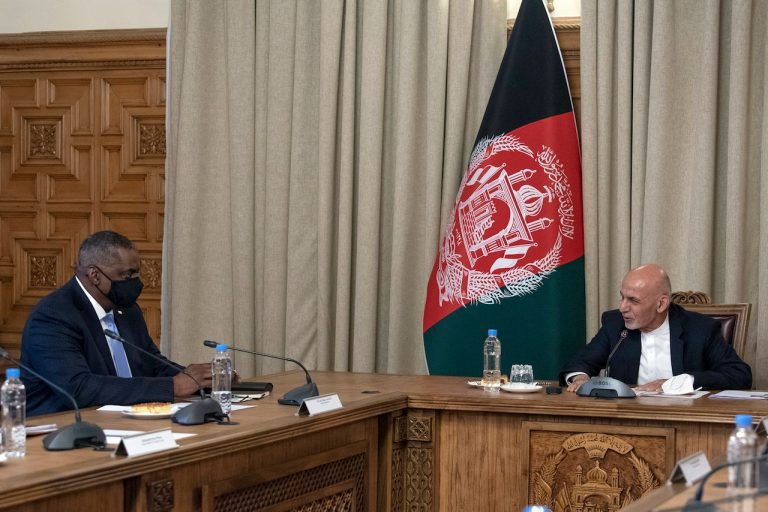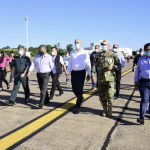The Afghan war which began in 2001 is now the longest war in American history. The war had formally ended in December 2014 and had cost $578.7 billion. There are about 2,500 U.S. troops currently in Afghanistan. [1] Another report states that the war has by now cost more than $2 trillion, and more than 2,300 American lives. More than 38,000 Afghan civilians have been killed.[2]
Earlier, the February 2020 Doha agreement between the Trump administration and the Taliban had called for a complete withdrawal of foreign troops from Afghanistan by the May 1, 2021 deadline in return for the Taliban entering peace negotiations with Ghani Government in Afghanistan which is its adversary, desisting from attacking US or NATO troops, and decreasing violence in the country. The Taliban had also committed to prevent Al Qaeda, or other militants, from launching terrorist attacks from Afghanistan. Since entering last year’s peace agreement with the US., the Taliban have indeed halted all attacks on U.S. or NATO forces. Afghan government’s security forces and civilian casualties remain high and there have been an increasing number of unclaimed bombings and targeted killings in the past few months. [3] The Afghan government and the Taliban have blamed each other, and the IS.[4] Later, the Taliban stalled the talks with the Afghan government as it did not meet the condition of the released of thousands of their men in a prisoner swap.[5]
On March 18, 2021, a meeting was hosted by Russia in Moscow to break stalemate in the Afghan peace process. Pakistan, China, the US and representatives of the Afghan Taliban and the Afghan government attended the meeting. A joint statement issued after the meeting urged both Afghan government and Taliban to hold talks to conclude the long-awaited peace agreement. Abdullah Abdulla, head of the Afghan peace council also called for an end to violence and the acceleration of the peace talks.[6]
On March 19, 2021, the Afghan government and the Taliban agreed to accelerate peace talks The Head of the Afghan peace council Abdullah Abdullah indicated his desire to talk with the Taliban to bring peace. The Afghan government reiterated its commitment for the peaceful settlement of the crisis in Afghanistan.[7]
On March 21, 2021 Defense Secretary Lloyd Austin made a visit to Afghanistan and met with Afghan President Ghani. They discussed the peace process and concerns over rising violence, according to the statement. The visit came at a crucial time for the Afghan peace process as US President Joe Biden’s administration reviews its plan for Afghanistan ahead of the May 1 troop withdrawal deadline agreed by the previous Trump administration with the Taliban.
The US has signaled difficulties in withdrawing all its forces from Afghanistan by May 1 deadline outlined in the Doha agreement.
Earlier, secretary Austin had said that President Biden was considering keeping US troops in Afghanistan until November.[8] Meanwhile, the Taliban on March 19, 2021 warned the Biden administration against reneging on its May 1 deadline for the complete withdrawal of foreign troops from Afghanistan, stressing that any violation will provoke a reaction. [9]
General Jens Stoltenberg said in February 2021 that the NATO will leave when the time is right. He maintained that the main issue is that Taliban must negotiate in good faith reduce violence and stop supporting international terrorist groups like al-Qaida.[10]
The Biden administration was moving quickly on the Afghan peace issue. As part of the four-point strategy by the Biden administration, a UN sponsored meeting of foreign ministers from Pakistan, China, Russia, Iran, and India is also likely to be convened. The meeting is aimed at developing a “unified approach” on the future of Afghanistan. The second conference is likely to be held in Turkey in April to quicken negotiations between the Afghan government and the Taliban. [11]
Meanwhile, the American public wants an end to the war. [12] President Joe Biden is facing increasing pressure as he weighs whether to fully withdraw U.S. troops from Afghanistan by May 1. Experts say the Taliban have not cut its ties with al-Qaeda, and the group has not kept its pledge to negotiate with the Afghan government.
A report from a leading Afghanistan study group co-chaired by former Chairman of Joint Chiefs of Staff Gen. Dunford had recommended that a “more flexible timeline based on conditions such as reduced violence” be followed. [13]
The Biden administration aims at a peace deal in Afghanistan that will pave the way for an honorable exit from the 19-year war. The plan includes the formation of a new interim government in Afghanistan consisting of both parties. Washington has given the Taliban and the Afghan government an eight-page peace proposal, which both sides are reviewing. It calls for an interim “peace government” which would shepherd Afghanistan toward constitutional reform and elections. Ghani has resisted an interim administration. He says elections alone are acceptable to bring a change of government.
Both the US and Kabul have called for a reduction in violence leading to a ceasefire. The Taliban say a ceasefire would be part of peace negotiations. However, the Taliban have not attacked US or NATO troops since signing the agreement.[14]
The Biden administration is now earnestly working towards achieving the goal. The geopolitics of Afghanistan is changing by the latest efforts of the U.S. and international powers to end the two-decade war.
Eventually, the peace process will lead to the exit of American troops from Afghanistan. The US has enjoyed decades of global military dominance, but some defense experts now very correctly argue that America’s overseas military might may not be worth it.
For the Afghanistan peace plan to succeed the US needs the help of regional players like Pakistan, China, Russia, India and even Iran. The assistance of Pakistan is vital because it has historic links with the Taliban. Though the Taliban’s connections with the Pakistani military establishment are certainly exaggerated, it has string links with some elements within the Taliban group like the Haqqani group and Quetta shura. Therefore, the US is very actively courting the Pakistan military establishment to secure its assistance for the success of the peace talks. The Pakistan military establishment is certainly on board the American peace project in Afghanistan. Meanwhile, Pakistan is also calling for a responsible withdrawal as it does not want Afghanistan to descend into political anarchy. Therefore, Pakistan shall be supportive of the Afghan peace process and can be counted to do what it can to help it.
Therefore, the recent high-level contacts of the Biden administration with the military establishment in Pakistan.
In the March 18, 2021 Moscow meeting Pakistan had expressed its desire that the international community needs to remain engaged in Afghanistan and help the country at this critical juncture. [15]
The US will exit Afghanistan by the end of the year or so. It may have a remaining footprint, but it will be significantly smaller than before. Most Americans want the war to end, and it certainly is high time that the US ended the war in Afghanistan. With proper planning and effort an exit strategy can be formulated. Firstly, the threat of al Qaeda has been significantly reduced. The total number of members of the militant entity is around 200 to 500 only and the threat can indeed be managed. There are many fighters that are known to be related to Taliban through tribal and inter-marriage inter-relations. These can be integrated in the Taliban through proper manipulation and coercion of these tribal connections. Similarly, the newer entity called the Islamic State (IS) also lacks the capability to hit targets beyond the immediate region. Today, the IS is under relentless military pressure from both the Taliban and the Afghan state security forces. Meanwhile, the number of Afghan security forces has grown to above 300,000 troops. Though Afghanistan is unstable and suffers from bad governance, endemic corruption, and poverty, it can be sustained through. needed assistance from the international. The peace process is the best opportunity to bring stability to Afghanistan. The Biden administration is following the correct approach to achieve a peace deal. [16]
With the Biden Administration now wavering, critics of the war are worried that the new administration will backtrack on the commitment to withdraw U.S. forces in Afghanistan by the May 2021 deadline.[17] Meanwhile, the Biden ministration is finally indicating that the May 1 deadline may not be met. Clearly the Biden administration is now working towards an Afghan peace deal beyond the May 1, deadline which will now be extended to at least six months to work out the new deal. incorporating the Taliban in an interim setup. The Biden administration has proposed an interim s government which would direct Afghanistan toward constitutional reform and elections.
The integration of the Taliban in the Afghan government will most likely stabilize the situation in the country. However, it is very unlikely, that the new government establishes any form of meaningful democracy in Afghanistan.
Obviously, incorporating the Taliban in the interim government setup will pose many problems because of the nature of the militant group. The Taliban are an Islamic movement with strong religious overtones. The Taliban’s insistence on establishing Islamic rule based on workable Sharia principles will not easily fit into US goals in Afghanistan. It is highly likely that the future Taliban coalition government will suppress the democratic political forces in Afghanistan. Many experts say the situation in Afghanistan will not improve no matter how much longer the US stays, or how much more money it invests. The Taliban now control vast swaths of the country, and it continues to be wracked by violence despite US-brokered peace talks.[18]
Meanwhile, there are increasing number of voices expressing for an exit strategy for the US troops in Afghanistan. Some scholars very correctly argue that the US has enjoyed decades of global military dominance, but America’s overseas military might may not be worth it. The Biden administration is clearly concerned about the mired intra-Afghan talks and is loosening patience with President Ghani’s tactics. The Biden administration desires that the Afghan government and the Taliban carry out the peace negotiations in a serious manner. The US wants a settlement done and dusted aims to compel the two sides to negotiate seriously. Some compromises must be made for an agreement. However, the US cannot dictate an Afghan settlement. The Biden administration’s draft agreement has been criticized as being imposed on the Afghans as it has not developed from the negotiations. The transitional government approach is sensible. Later, a permanent government can be established after the approval of a new constitution and elections. However, the ability of the Taliban and the Afghan government to make the required compromises remains an open question.[19]
On March 191, 2021, the Taliban spokesman had said that the government of President Ghani did not match their vision of an “Islamic government,” but did not elaborate. Critics fear that the Taliban might desire a return to their repressive rules that, barred women from working, and imposed harsh punishments for even minor offenses, and forbade even girls’ education.[20]
Although the Taliban group is indeed cruel and brutal, it does not have any transnational terrorist ambitions like the as al-Qaeda.
The new interim Afghanistan government including Taliban representatives would be challenged by both Russia and Iranian. However, that does not mean to suggest that the peace project would be sabotaged by Russia as such. Both desire peace in the country and withdrawal of American troops from the country. The strategic interests of Iran and Russia converge with that of the US end Afghanistan’s costly conflict.
Therefore, both may come to realize that the Taliban must be accommodated in the new setup.
The actions taken by the Biden administration are indeed a good starting point in reviving the stalled Afghan peace talks. Although, the May 1 deadline will not be met, it can be hoped that the American troops will exit by the end of the year or so. Meanwhile, the Afghan government and the Taliban continue to negotiate a peace deal to end the war, even as violent attacks continue
What is new in the Biden administration’s Afghan policy is the international approach where allies and even adversaries are being reached to help achieve peace and stability in Afghanistan and an eventual exit of American military forces from the country. The approach must be commended as it is the required departure from the previous Trump administration’s largely unilateral one. Undoubtedly, better diplomacy can be expected from the Biden administration simply because of the experienced and capable hands guiding it now. An end of the longest American war is now in sight. Certainly, many pitfalls remain in achieving peace in the war-torn Afghanistan. It is not going to be easy and will require an international effort to achieve peace and stability in the country. There is hope yet.
[1] Amanda Macias , “Defense secretary travels to Afghanistan as troop withdrawal deadline looms , CNBC March 21, 2021, https://www.cnbc.com/2021/03/21/austin-travels-to-afghanistan-as-troop-withdrawal-deadline-looms.html, accessed March 22, 2021; and Martin Pengelly, “US defense secretary Austin visits Afghanistan as exit deadline looms”, The Guardian, March 21, 2021
https://www.theguardian.com/world/2021/mar/21/us-defense-secretary-lloyd-austin-afghanistan-ashraf-ghani-troop-withdrawal, accessed March 21, 2021
[2] Deirdre Shesgreen, “Biden faces Trump’s deadline on Afghanistan troop withdrawal: ‘Any way you cut it, we are headed for a messy outcome’”, USA Today, March 17, 2021, https://www.usatoday.com/in-depth/news/politics/2021/03/17/us-troop-withdrawal-afghanistan-trumps-deadline-weighs-biden/4667248001/, accessed March 21, 2021;
[3] Deirdre Shesgreen, “Biden faces Trump’s deadline on Afghanistan troop withdrawal: ‘Any way you cut it, we are headed for a messy outcome’”, USA Today, March 17, 2021, https://www.usatoday.com/in-depth/news/politics/2021/03/17/us-troop-withdrawal-afghanistan-trumps-deadline-weighs-biden/4667248001/, accessed March 21, 2021
[3]
[4] Martin Pengelly, “US defense secretary Austin visits Afghanistan as exit deadline looms”, The Guardian, March 21, 2021
https://www.theguardian.com/world/2021/mar/21/us-defense-secretary-lloyd-austin-afghanistan-ashraf-ghani-troop-withdrawal, accessed March 21, 2021
[5] Deirdre Shesgreen, “Biden faces Trump’s deadline on Afghanistan troop withdrawal: ‘Any way you cut it, we are headed for a messy outcome’”, USA Today, March 17, 2021, https://www.usatoday.com/in-depth/news/politics/2021/03/17/us-troop-withdrawal-afghanistan-trumps-deadline-weighs-biden/4667248001/, accessed March 21, 2021
Afghanistan: US Defense Secretary Lloyd Austin on unannounced Kabul visit, BBC March 21, 2021, https://www.bbc.com/news/world-asia-56476995, accessed March 21, 2021
Taliban Warn U.S. of ‘Reaction’ if Troops Stay in Afghanistan After May 1, Newsweek Pakistan March 20, 2021 https://www.newsweekpakistan.com/taliban-warn-u-s-of-reaction-if-troops-stay-in-afghanistan-after-may-1/, accessed March 21, 2021
Martin Pengelly, “US defense secretary Austin visits Afghanistan as exit deadline looms”, The Guardian, March 21, 2021
https://www.theguardian.com/world/2021/mar/21/us-defense-secretary-lloyd-austin-afghanistan-ashraf-ghani-troop-withdrawal, accessed March 21, 2021
[6] “Pakistan and Russia make a strong appeal to Afghan Taliban in Moscow”, Times of Islamabad, March 19, 2021, https://timesofislamabad.com/19-Mar-2021/pakistan-and-russia-makes-a-strong-appeal-to-afghan-taliban-in-moscow, accessed March 22, 2021
[7] US Defense Secretary meets Afghan president in Kabul, Express Tribune, March 22, 2021, https://tribune.com.pk/story/2290674/us-defence-secretary-meets-afghan-president-in-kabul, accessed March 22, 2021
[8] Alex Leff, “U.S. Defense Chief Austin Goes To Afghanistan Amid Questions Over Withdrawal Date”, NPR, March 21, 2021, https://www.npr.org/2021/03/21/979704208/u-s-defense-chief-austin-goes-to-afghanistan-amid-questions-over-withdrawal-date, accessed March 22, 2021
[9] Ellen Mitchell, “Taliban warn of ‘reaction’ if US doesn’t withdraw by May deadline”, March 19, 2021
https://thehill.com/policy/defense/544056-taliban-warn-of-reaction-if-us-doesnt-withdraw-by-may-deadline, accessed March 19, 2021
Taliban Warn U.S. of ‘Reaction’ if Troops Stay in Afghanistan After May 1, Newsweek Pakistan March 20, 2021 https://www.newsweekpakistan.com/taliban-warn-u-s-of-reaction-if-troops-stay-in-afghanistan-after-may-1/, accessed March 21, 2021
[10] Alex Leff, “U.S. Defense Chief Austin Goes To Afghanistan Amid Questions Over Withdrawal Date”, NPR, March 21, 2021, https://www.npr.org/2021/03/21/979704208/u-s-defense-chief-austin-goes-to-afghanistan-amid-questions-over-withdrawal-date, accessed March 22, 2021
[11] Ivana Saric, “Defense Secretary Lloyd Austin makes surprise visit to Afghanistan”, Axios, March 21, 2021. https://www.axios.com/defense-secretary-surprise-afghanistan-0ce9c20c-c1c1-4df5-a29b-c993048211c3.html, accessed March 21, 2021
[12] Deirdre Shesgreen, “Biden faces Trump’s deadline on Afghanistan troop withdrawal: ‘Any way you cut it, we are headed for a messy outcome’”, USA Today, March 17, 2021, https://www.usatoday.com/in-depth/news/politics/2021/03/17/us-troop-withdrawal-afghanistan-trumps-deadline-weighs-biden/4667248001/, accessed March 21, 2021
[13] Barbara Starr and Kevin Liptak, “Biden administration considering 6-month extension for US troops in Afghanistan”, CNN, March 18, 2021
https://www.cnn.com/2021/03/18/politics/afghanistan-troop-extension/index.html, accessed March 19, 2021
[14] Martin Pengelly, “US defense secretary Austin visits Afghanistan as exit deadline looms”, The Guardian, March 21, 2021
https://www.theguardian.com/world/2021/mar/21/us-defense-secretary-lloyd-austin-afghanistan-ashraf-ghani-troop-withdrawal, accessed March 21, 2021
[15] Pakistan and Russia make a strong appeal to Afghan Taliban in Moscow
Times of Islamabad, March 19, 2021, https://timesofislamabad.com/19-Mar-2021/pakistan-and-russia-makes-a-strong-appeal-to-afghan-taliban-in-moscow, accessed March 22, 2021
[16] Opinion by Charles A. Kupchan and Douglas Lute, “Biden should withdraw US troops from Afghanistan. Here’s why”, CNN https://www.cnn.com/2021/03/18/opinions/afghanistan-us-troops-withdrawal-biden-kupchan-lute/index.html, accessed March 19, 2021Biden
[17] Ibid
[18] Deirdre Shesgreen, “Biden faces Trump’s deadline on Afghanistan troop withdrawal: ‘Any way you cut it, we are headed for a messy outcome’”, USA Today, March 17, 2021, https://www.usatoday.com/in-depth/news/politics/2021/03/17/us-troop-withdrawal-afghanistan-trumps-deadline-weighs-biden/4667248001/, accessed March 21, 2021
[18]
[19] Maleeha Lodi. “Challenging roadmap to peace> Dawn, March 22, 2021https://www.dawn.com/news/1613932/challenging-roadmap-to-peace, accessed March 22, 2021
[20] Taliban Warn U.S. of ‘Reaction’ if Troops Stay in Afghanistan After May 1, Newsweek Pakistan March 20, 2021 https://www.newsweekpakistan.com/taliban-warn-u-s-of-reaction-if-troops-stay-in-afghanistan-after-may-1/, accessed March 21, 2021 Ellen Mitchell, “Taliban warn of ‘reaction’ if US doesn’t withdraw by May deadline”, , The Hill, March 19, 2021
https://thehill.com/policy/defense/544056-taliban-warn-of-reaction-if-us-doesnt-withdraw-by-may-deadline, accessed March 19, 2021
Author
-

Political Analyst, PHD, an independent scholar focusing on global politics, American foreign policy, governance, and political issues of South and West Asia regions.
View all posts





